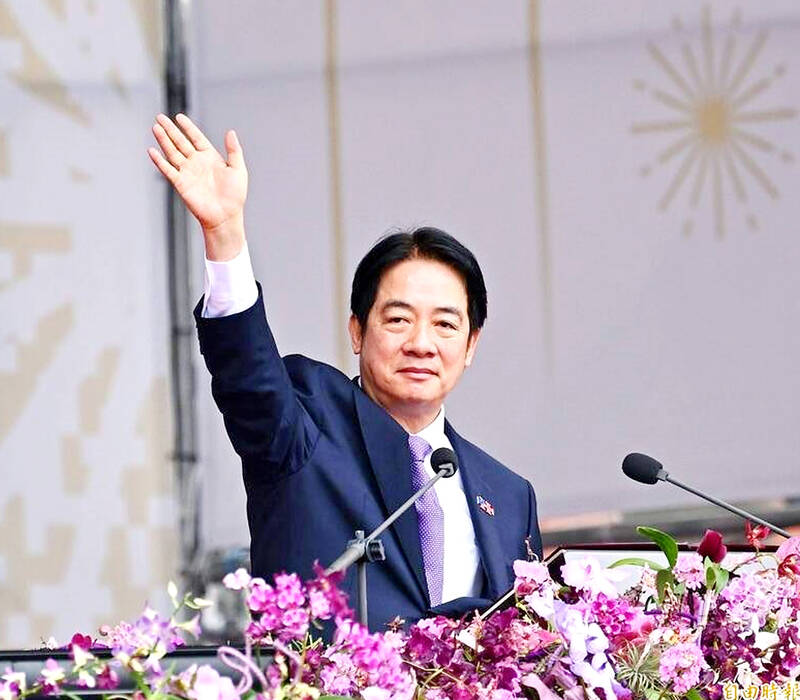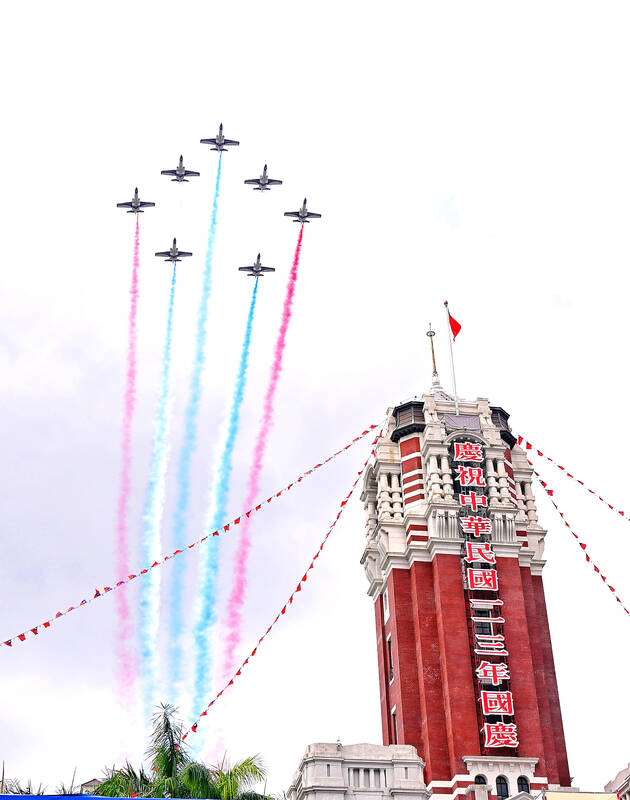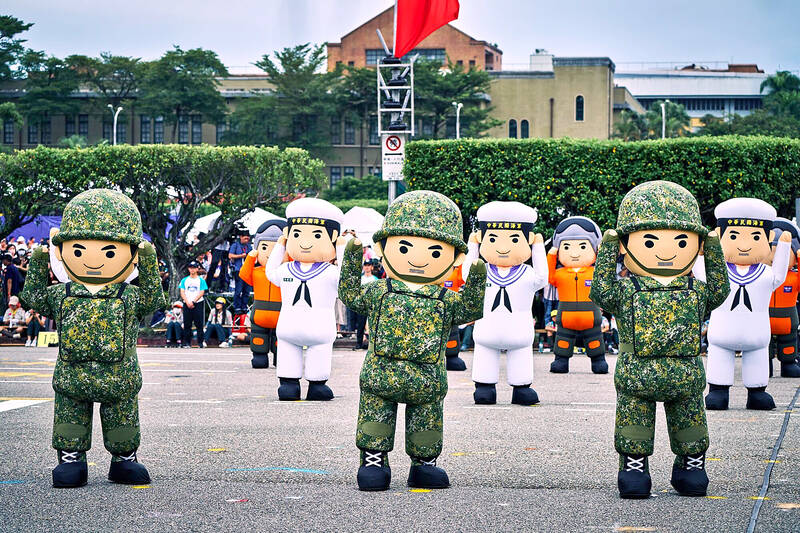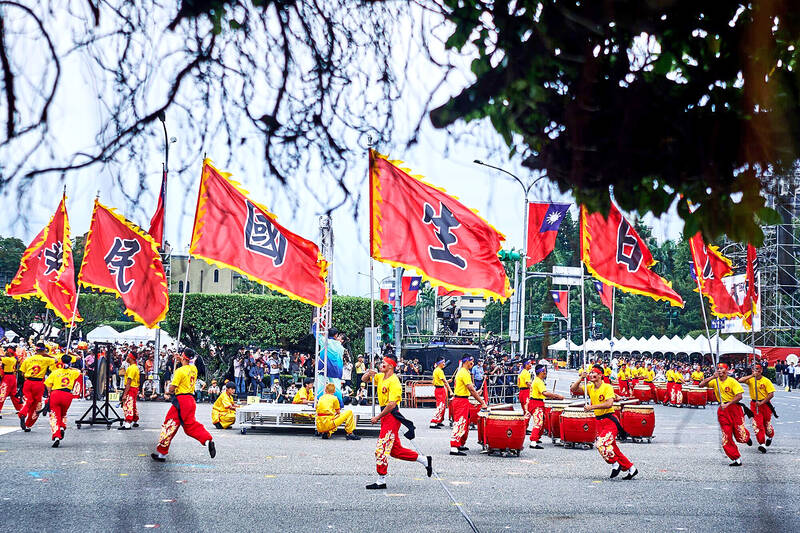President William Lai (賴清德) yesterday said that China has “no right to represent Taiwan,” but stressed that the nation was willing to work with Beijing on issues of mutual interest.
“The Republic of China has already put down roots in Taiwan, Penghu, Kinmen and Matsu,” Lai said in his first Double Ten National Day address outside the Presidential Office Building in Taipei. “And the Republic of China and the People’s Republic of China [PRC] are not subordinate to each other.”
“The People’s Republic of China has no right to represent Taiwan,” he said at the event marking the 113th National Day of the Republic of China, adding that his “mission” as president was to “ensure that our nation endures and progresses” and “resist annexation or encroachment upon our sovereignty.”

Photo: CNA
The president’s comments in front of opposition party leaders, foreign delegates and other assembled guests were in line with his inaugural speech in May, which prompted Beijing to launch large-scale military drills around Taiwan as “punishment” for so-called “separatist acts.”
However, unlike in previous remarks in which he criticized Beijing for engaging in “gray zone” activities and cognitive warfare against Taiwan, Lai’s speech did not touch upon these points.
While warning against the “expanding authoritarianism” that is “threatening our hard-won free and democratic way of life,” Lai said his administration was “willing to work with China on addressing climate change, combating infectious diseases and maintaining regional security.”

Photo: Fang Pin-chao, Taipei Times
He also expressed hope for “healthy and orderly dialogue and exchanges” across the Taiwan Strait based on the principles of “parity and dignity.”
At the same time, the president reiterated the government’s commitment to defend “national sovereignty” and “maintain the status quo of peace and stability in the Taiwan Strait” through his “four pillars of peace” plan.
The plan, first proposed by Lai while he was running for president, emphasizes the importance of Taiwan’s defensive strength, economic security, partnerships with other democracies and a consistent cross-strait policy.

Photo: Fang Pin-chao, Taipei Times
Lai also called on the PRC to “live up to the expectations of the international community” by playing a bigger role toward ending Russia’s invasion of Ukraine and conflicts in the Middle East.
“We hope that it will take up its international responsibilities and, along with Taiwan, contribute to the peace, security and prosperity of the region and the globe,” Lai said.
The international community has “assisted” the PRC in joining the WTO, which resulted in “promoting China’s economic development and enhancing its national strength,” he said.

Photo: An Rong Xu, Bloomberg
“This was done out of the hope that China would join the rest of the world in making global contributions, that internally it would place importance on the livelihoods of the people and that externally it would maintain peace,” Lai said.
The PRC is facing growing pressure from Western countries over its ties to Russia and allegations it is aiding Moscow’s war efforts in Ukraine by providing dual-use goods that can have military applications.
Beijing denies this and says the West instead is fueling the conflict by supplying arms to Ukraine.

Photo: An Rong Xu, Bloomberg
Lai, whose Democratic Progressive Party won an unprecedented third consecutive presidential term while losing a majority to the opposition in the legislature in January’s elections, also called for unity among Taiwanese across party lines.
“Our nation must become more united, and our society must grow more stable,” he said.
In Beijing, Chinese Ministry of Foreign Affairs spokeswoman Mao Ning (毛寧) said Lai was “hell-bent” on independence.
Lai’s speech “exposed his hell-bent position on Taiwan independence and his sinister intention to escalate tensions in the Taiwan Strait for political self-interest,” Mao told a regular news briefing.
“Taiwan has never been a country and can never become one, so it does not have any so-called ‘sovereignty,’” Mao said.
She added that Lai’s comments “arbitrarily severed the historical connection between the two sides of the Taiwan Strait” and used “all manner of tactics to peddle the fantasy of Taiwan independence.”
Officials in Taipei have said that Beijing is likely to follow Lai’s speech with military drills, which Washington has called unjustified.
“Even though we have not seen significant military activity or exercises following previous 10/10 speeches, we are prepared that Beijing may choose to use this as a pretext this year,” a senior US official said on Wednesday.
“Again, we see no justification for a routine annual celebration to be used in this manner. Coercive actions like this against Taiwan and in the cross-strait context, in our view, undermine cross-strait stability,” the official said.
In the 24 hours ending at 6am yesterday, the Ministry of National Defense reported 27 Chinese People’s Liberation Army aircraft, nine naval vessels and five official ships operating around Taiwan.
Fifteen of the aircraft crossed the median line of the Taiwan Strait into Taiwan’s northern, central and southwestern air defense identification zone, it said, adding that the military “monitored the situation and responded.”
Additional reporting by AFP and Reuters

A magnitude 5.6 earthquake struck off the coast of Yilan County at 12:37pm today, with clear shaking felt across much of northern Taiwan. There were no immediate reports of damage. The epicenter of the quake was 16.9km east-southeast of Yilan County Hall offshore at a depth of 66.8km, Central Weather Administration (CWA) data showed. The maximum intensity registered at a 4 in Yilan County’s Nanao Township (南澳) on Taiwan’s seven-tier scale. Other parts of Yilan, as well as certain areas of Hualien County, Taipei, New Taipei City, Taoyuan, Hsinchu County, Taichung and Miaoli County, recorded intensities of 3. Residents of Yilan County and Taipei received

Taiwan has secured another breakthrough in fruit exports, with jujubes, dragon fruit and lychees approved for shipment to the EU, the Ministry of Agriculture said yesterday. The Animal and Plant Health Inspection Agency on Thursday received formal notification of the approval from the EU, the ministry said, adding that the decision was expected to expand Taiwanese fruit producers’ access to high-end European markets. Taiwan exported 126 tonnes of lychees last year, valued at US$1.48 million, with Japan accounting for 102 tonnes. Other export destinations included New Zealand, Hong Kong, the US and Australia, ministry data showed. Jujube exports totaled 103 tonnes, valued at

BIG SPENDERS: Foreign investors bought the most Taiwan equities since 2005, signaling confidence that an AI boom would continue to benefit chipmakers Taiwan Semiconductor Manufacturing Co’s (TSMC, 台積電) market capitalization swelled to US$2 trillion for the first time following a 4.25 percent rally in its American depositary receipts (ADR) overnight, putting the world’s biggest contract chipmaker sixth on the list of the world’s biggest companies by market capitalization, just behind Amazon.com Inc. The site CompaniesMarketcap.com ranked TSMC ahead of Saudi Aramco and Meta Platforms Inc. The Taiwanese company’s ADRs on Tuesday surged to US$385.75 on the New York Stock Exchange, as strong demand for artificial intelligence (AI) applications led to chip supply constraints and boost revenue growth to record-breaking levels. Each TSMC ADR represents

TRUST: The KMT said it respected the US’ timing and considerations, and hoped it would continue to honor its commitments to helping Taiwan bolster its defenses and deterrence US President Donald Trump is delaying a multibillion-dollar arms sale to Taiwan to ensure his visit to Beijing is successful, a New York Times report said. The weapons sales package has stalled in the US Department of State, the report said, citing US officials it did not identify. The White House has told agencies not to push forward ahead of Trump’s meeting with Chinese President Xi Jinping (習近平), it said. The two last month held a phone call to discuss trade and geopolitical flashpoints ahead of the summit. Xi raised the Taiwan issue and urged the US to handle arms sales to